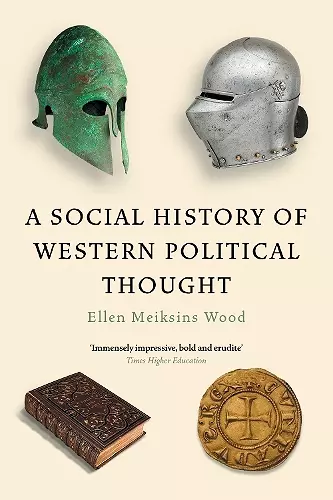A Social History of Western Political Thought
Format:Paperback
Publisher:Verso Books
Published:30th Aug '22
Should be back in stock very soon

A sweeping and nuanced materialist history of Western political thought
In this groundbreaking work, Ellen Meiksins Wood rewrites the history of political theory, from Plato to Rousseau. Treating canonical thinkers as passionately engaged human beings, Wood examines their ideas not simply in the context of political languages but as creative responses to the social relations and conflicts of their time and place. She identifies a distinctive relation between property and state in Western history and shows how the canon, while largely the work of members or clients of dominant classes, was shaped by complex interactions among proprietors, labourers and states. Western political theory, Wood argues, owes much of its vigour, and also many ambiguities, to these complex and often contradictory relations.
In the first volume, she traces the development of the Western tradition from classical antiquity through to the Middle Ages in the perspective of social history - a significant departure not only from the standard abstract history of ideas but also from other contextual methods. From the Ancient Greek polis of Plato, Aristotle, Aeschylus and Sophocles, through the Roman Republic of Cicero and the Empire of St Paul and St Augustine, to the medieval world of Averroes, Thomas Aquinas and William of Ockham, Wood offers a rich, dynamic exploration of thinkers and ideas that have indelibly stamped our modern world.
In the second volume, Wood addresses the formation of the modern state, the rise of capitalism, the Renaissance and Reformation, the scientific revolution and the Age of Enlightenment, which have all been attributed to the "early modern" period. Nearly everything about its history remains controversial, but one thing is certain: it left a rich and provocative legacy of political ideas unmatched in Western history. The concepts of liberty, equality, property, human rights and revolution born in those turbulent centuries continue to shape, and to limit, political discourse today. Assessing the work and background of figures such as Machiavelli, Luther, Calvin, Spinoza, the Levellers, Hobbes, Locke and Rousseau, Ellen Wood vividly explores the ideas of the canonical thinkers, not as philosophical abstractions but as passionately engaged responses to the social conflicts of their day.
Meiksins Wood is a rare breed - an academic with the soul of a storyteller. * Morning Star *
Few historians of comparative political thought are in the same league as Ellen Wood, who surveys the whole sweep of ancient and medieval thinkers with equal magisterial brilliance of insight. -- Professor Paul Cartledge, University of Cambridge
A challenging analysis, which successfully integrates theory with historical changes. The clarity of the writing makes her account readily accessible to any reader ready to engage a fresh approach to the history of political theory. -- Sheldon Wolin
Immensely impressive, bold and erudite. Meiksins Wood's conclusions are undeniably nuanced, challenging and important. This book ought to be compulsory reading for us all. * Times Higher Education Supplement *
This book is clearly written, incisively argued, and immensely informative. * CHOICE *
A notable book, wide-ranging and perceptive. Wood addresses the heartland of the historiography of political thought from Machiavelli to Rousseau, the territory of its most successful recent practitioners. -- Jonathan Clark * Times Literary Supplement *
The writing is so supple and accessible, and the argument so persuasive, it's like watching a cloudy mixture of ideas being turned into a clear solution. -- Adrienne Rich
Wood was an extraordinarily rigorous and imaginative thinker, someone who breathed life into Marxist political theory and made it speak-not to just to me but to many others-at multiple levels: historical, theoretical, political. -- Corey Robin * Jacobin *
ISBN: 9781839766091
Dimensions: 210mm x 140mm x 37mm
Weight: 522g
592 pages